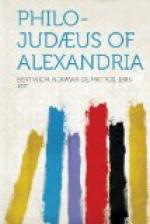As a prelude to the study of Greek philosophy he built up a harmony of the mind by a study of Greek poetry, rhetoric, music, mathematics, and the natural sciences. His works bear witness to the thoroughness with which he imbibed all that was best in Greek literature. His Jewish predecessors had written in the impure dialect of the Hellenistic colonies (the [Greek: koine dialektos]), and had shown little literary charm; but Philo’s style is more graceful than that of any Greek prose writer since the golden age of the fourth century. Like his thought, indeed, it is eclectic and not always clear, but full of reminiscences of the epic and tragic poets on the one hand, and of Plato on the other,[47] it gives a happy blending of prose and poetry, which admirably fits the devotional philosophy that forms its subject. And what was said of Plato by a Greek critic applies equally well to Philo: “He rises at times above the spirit of prose in such a way that he appears to be instinct, not with human understanding, but with a Divine oracle.” From the study of literature and kindred subjects Philo passed on to philosophy, and he made himself master of the teachings of all the chief schools. There was a mingling of all the world’s wisdom at Alexandria in his day; and Philo, like the other philosophers of the time, shows acquaintance with the ideas of Egyptian, Chaldean, Persian,[48] and even Indian thought. The chief Greek schools in his age were the Stoic, the Platonic, the Skeptic and the Pythagorean, which had each its professors in the Museum and its popular preachers in the public lecture-halls. Later we will notice more closely Philo’s relations to the Greek philosophers: suffice it here to say that he was the most distinguished Platonist of his age.
Philo’s education therefore was largely Greek, and his method of thought, and the forms in which his ideas were associated and impressed, were Greek. It must not be thought, however, that this involved any weakening of his Judaism, or detracted from the purity of his belief. Far from it. The Torah remained for him the supreme standard to which all outside knowledge had to be subordinated, and for which it was a preparation.[49] But Philo brought to bear upon the elucidation of the Torah and Jewish law and ceremony not only the religious conceptions




